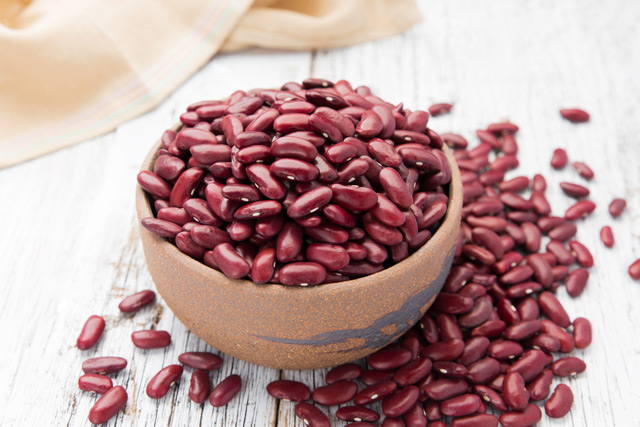
Advertisement
Adzuki beans are one of the most important legumes in East Asia. The beans are usually used as a natural sweetener for pastries and desserts because of their distinctly sweet flavor. But it’s not just their ability to act as a sweetener that makes adzuki beans interesting. Their many health benefits also make them a food worth knowing.
One study by researchers from South Korea highlighted black adzuki beans’ anti-inflammatory and antioxidant properties. After examining the effects of black adzuki beans in mice fed a high-fat diet, they found that the beans reduced biomarkers of inflammation. The beans also weakened the effects of inflammation on the colon. This suggests that adzuki beans can protect the colon from inflammatory conditions, such as Crohn’s disease and ulcerative colitis.
Adzuki beans help reduce inflammation and improve blood sugar control
Adzuki beans owe their anti-inflammatory properties to powerful compounds that work as antioxidants. A study funded by the Spanish National Research Council identified at least 29 antioxidants in adzuki beans, including catechins, epicatechin glucosides, myricetin and protocatechuic acid.
The anti-inflammatory properties of adzuki beans were the highlight of a study conducted by Chinese researchers. This study showed that adzuki beans can reduce inflammation in people with Type 2 diabetes.
The researchers sought to investigate the effects of extruded adzuki beans on inflammation and glucose control in people with Type 2 diabetes. To this end, they conducted a four-week randomized clinical trial, which involved 120 people with Type 2 diabetes. The diabetics were assigned to eat either a low-glycemic diet or one with extruded adzuki beans.
The participants’ diet information and blood samples were collected at baseline and at the end of the four-week trial. The researchers analyzed the samples for biomarkers of inflammation and glucose control.
They found that participants who ate the diet with extruded adzuki beans had better glycemic control than those who ate a low-glycemic diet. Tight glycemic control is considered an essential strategy to prevent complications in people with Type 2 diabetes.
The researchers also found that those who ate the diet with extruded adzuki beans had fewer pro-inflammatory biomarkers than those who ate a low-glycemic diet.
Given their findings, the researchers concluded that extruded adzuki beans can be used to help those with Type 2 diabetes optimize their dietary patterns.
The scoop on adzuki beans
Adzuki beans can do more than just reduce inflammation. They can also provide you with many key nutrients, such as protein, fiber and carbohydrates. Adzuki beans’ fiber content is particularly robust, especially when compared to white beans, kidney beans and soybeans.
The fiber in adzuki beans and most other beans is soluble fiber. This fiber attracts water and turns to gel during digestion. It acts like a sponge, soaking up excess cholesterol. It can also help you feel full for longer, making you less likely to indulge your cravings, overeat during meals or snack between them.
Adzuki beans are also packed with protein, which means they make a great meat substitute. Like most beans, adzuki beans are an excellent source of complex carbohydrates, which provide more lasting energy in your body than simple carbohydrates.
Adzuki beans also contain vitamins and minerals that can help you maintain optimal overall health, such as B vitamins, manganese, phosphorus, potassium, copper, magnesium, zinc and iron.
Recipe for black adzuki bean bowl
Want to try adzuki beans? Here’s an easy recipe for black adzuki bean bowl.
Ingredients for black adzuki bean bowl:
- 3 small carrots, shaved
- 2 avocados, sliced
- 1 small red chili pepper, sliced
- 1/2 large Napa cabbage head, sliced (makes 6 1/2 cups)
- 1 1/2 cups cooked black adzuki beans
- 1 cup sugar snap peas, sliced
- 1 cup cooked brown rice
- 2 tablespoons sesame seeds, plus more for serving
- 2 tablespoons chopped fresh cilantro, plus more for serving
Ingredients for miso dressing:
- 1/3 cup rice vinegar
- 1/4 cup white miso
- 1/4 cup olive oil
- 3 tablespoons tamari (gluten-free Japanese soy sauce)
- 1 tablespoon toasted sesame oil
Directions:
- In a small bowl, whisk the dressing ingredients.
- In a large bowl, mix the cabbage, carrots, snap peas and sesame seeds with 1/4 cup of the dressing.
- Just before serving, add the cilantro to the cabbage salad.
- Divide the black adzuki beans, rice, cabbage salad and avocados among four bowls.
- Drizzle with more dressing as desired and sprinkle with chili, cilantro and sesame seeds. Serve and enjoy.
Adzuki beans can reduce inflammation, thanks to the many antioxidants they contain. They are also rich in key nutrients that support optimal overall health, such as fiber, protein and carbohydrates. Incorporate adzuki beans into your daily routine to enjoy their nutritional benefits.
Sources:
Advertisements







